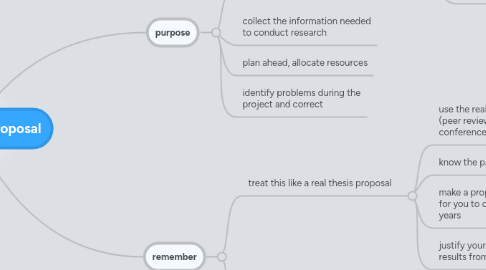
1. remember
1.1. treat this like a real thesis proposal
1.1.1. use the real research literature (peer reviewed journals and conferences)
1.1.2. know the papers you cite in detail
1.1.3. make a proposal that is feasible for you to carry out in three years
1.1.4. justify your research with results from the literature
1.2. proposal presentation
1.2.1. you will be asked to present your proposal briefly; be prepared
1.2.2. you should be able to answer technical questions
1.2.3. you should be able to summarize and talk about the technical content of each of the papers you reference
2. finding a topic
2.1. what do you care about?
2.1.1. space exploration?
2.1.2. economic justice?
2.1.3. human rights?
2.1.4. making money?
2.1.5. understanding the mind / biology?
2.1.6. improving education?
2.2. what are your skills? (and how do you like spending your time?)
2.2.1. programming?
2.2.2. math?
2.2.3. reading/writing?
2.2.4. speaking?
2.2.5. teaching?
2.2.6. building things?
2.2.7. working with others?
2.3. what does the job market want?
2.3.1. what are Google / Facebook / ... hiring in?
2.3.2. what are the hot startups doing?
2.3.3. what skills are going to be automated / obsolete soon?
2.4. what is "hot" in the scientific community?
2.4.1. what do people give talks on at conferences / at university departments?
2.4.2. do you go to talks in our department?
2.5. how do you research these questions?
3. structure
3.1. Title
3.1.1. Pick a good title.
3.1.2. Start with a preliminary title, then revise after the proposal is done.
3.2. Introduction
3.2.1. topic
3.2.2. research question / hypothesis
3.2.3. significance to science
3.2.4. practical significance
3.2.5. STRATEGY
3.2.5.1. you're addressing both experts and non-experts
3.2.5.2. look for economic significance of area
3.2.5.3. look at the history of the question/topic
3.2.5.4. have any famous people looked at this?
3.2.5.5. does it relate to problems your reader might have?
3.2.5.6. think about what "inspired" the question; you can't necessarily put it in like that, but it is a good guide
3.2.5.7. e.g., the mind/body problem motivates ...; the Chinese room experiment motivates ...
3.3. Literature Review
3.3.1. prior work related to the topic
3.3.2. your prior publications on the topic
3.3.3. your preliminary work on the topic
3.3.4. unanswered questions (and show that they are unanswered)
3.3.5. STRATEGY
3.3.5.1. identify the primary conferences and journals related to the topic
3.3.5.2. identify the most important topics in the community, think about how they relate to your current topic
3.3.5.3. relate the literature to the research question(s) you identified in the introduction
3.4. Methodology
3.4.1. general approach
3.4.2. step-by-step strategy
3.4.2.1. what are you going to do?
3.4.2.2. what are you going to deliver?
3.4.2.3. what do you do in case a step fails? what are your backup strategies?
3.4.3. required resources
3.4.3.1. what data do you need? how difficult is it to get?
3.4.3.2. what software/hardware do you need?
3.4.4. what statistical / mathematical techniques will you use for evaluation?
3.5. Expected Results
3.5.1. concisely list the results you expect to get from your experiments / theories
3.5.2. relate them to the hypotheses / questions in the introduction
3.5.3. address
3.5.3.1. success
3.5.3.2. risks
3.5.3.3. publication strategy
3.6. Time Table and Deliverables
3.6.1. this summarizes in tabular form the strategy from the methodology section
3.6.2. the table should divide the thesis into 6 month blocks with 1-3 activities in parallel
3.6.3. at the end of each block, there should be a clear and verifiable deliverable
3.7. Budget
3.7.1. if there are significant expenses / hardware requirements, list a budget
3.7.2. this also includes a publication plan and publication-related travel
3.8. Bibliography
3.8.1. list of all the references from the rest of the proposal
3.8.2. sometimes, you might create an annotated bibliography that goes beyond what you cover in the introduction
4. purpose
4.1. convince others to support your research
4.1.1. Ph.D. thesis
4.1.2. research funding
4.2. collect the information needed to conduct research
4.3. plan ahead, allocate resources
4.4. identify problems during the project and correct
5. structure of a proposal
5.1. generally
5.1.1. research proposal are similar to scientific research papers
5.1.2. use future tense
5.1.3. there are lots of online resources about how to write proposal
5.1.4. there are lots of examples of research proposals on the web, many genuine, some constructed for demonstration purposes
5.1.4.1. NB: not all of them are good
5.2. general components
5.2.1. literature review
5.2.2. required resources
5.2.3. research plan
5.2.4. expected research results
5.2.5. proposed budget
5.2.6. CV and prior publications of all researchers
